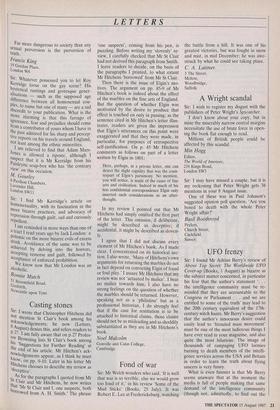Casting stones
Sir: I wrote that Christopher Hitchens did not mention St Clair's book among his acknowledgements; he now (Letters, 8 August) denies this, and refers readers to P.27. I am fully aware that on p.27 Profes- sor Browning lists St Clair's book among his 'Suggestions for Further Reading' at the end of his article. Mr Hitchen's ack- nowledgements appear, as I think he must know, on pp. 9-10. Later in his letter Mr Hitchens chooses to describe my review as deceptive'. As for the paragraphs I quoted from Mr St Clair and Mr Hitchens, he now writes that `Mr St Clair and I, one suspects, both borrowed from A. H. Smith.' The phrase 'one suspects', coming from his pen, is puzzling. Before writing my 'slovenly' re- view, I carefully checked that Mr St Clair had not derived this paragraph from Smith. I leave readers to decide, on the basis of the paragraphs I printed, to what extent Mr Hitchens 'borrowed' from Mr St Clair.
Then there is the issue of Elgin's mo- tives. The argument on pp. 85-9 of Mr Hitchen's book is indeed about the effect of the marbles on the fine arts of England. But the question of whether Elgin was motivated by the desire to produce that effect is touched on only in passing; as the sentence cited in Mr Hitchen's letter illus- trates, readers are given the impression that Elgin's utterances on this point were exaggerated and that they were made, in particular, for purposes of retrospective self-justification. On p. 45 Mr Hitchens comments as follows on part of a letter written by Elgin in 1801:
Here, perhaps, in a private letter, one can detect the slight cupidity that was the coun- terpart of Elgin's parsimony, No mention, you will notice, is made of the cause of fine arts and civilisation. Indeed in much of his less confidential correspondence Elgin only inserted such considerations as an after- thought.
In my review I pointed out that Mr Hitchens had simply omitted the first part of the letter. This omisson, if deliberate, might be described as deceptive; if accidental, it might be described as sloven- ly.
I agree that I did not discuss every element of Mr Hitchen's book. As I made clear, I concentrated on its historical sec- tion. I also wrote, 'Many of Hitchens's own arguments for returning the marbles do not in fact depend on convicting Elgin of fraud or foul play.' I assure Mr Hitchens that my review was not 'actuated by malice'. I bear no malice towards him; I also have no strong feelings on the question of whether the marbles should be returned. However, speaking not as a 'philistine' but as a professional historian, I do strongly feel that if the case for restitution is to be attached to historical claims, those claims should not be as misleading and as shoddily substantiated as they are in Mr Hitchens's book.
Noel Malcolm
Gonville and Caius College, Cambridge


















































 Previous page
Previous page